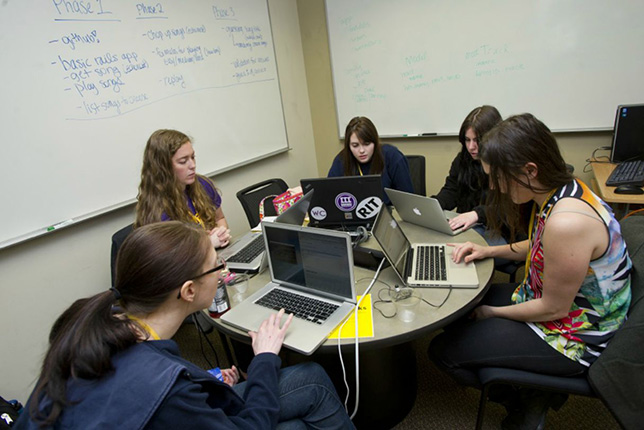Rochester Institute of Tech Opens Center Focused on 'Computing Science for All'
- By Dian Schaffhauser
- 09/27/17

RIT computer science students
The typical curriculum for a computer science major will probably do little to draw non-CS students to the field. An entry-level CS course at one well-known university, for example, says its students will be exposed to "basic programming methodology (engineering, modularity, documentation), data abstractions (stacks, queues, linked lists, hash tables, binary trees, generics and templates), recursion (procedural, backtracking), searching and sorting, and basic algorithmic analysis."
Such jargon often eclipses the fact that non-CS students could get a lot out of studying aspects of computer science. Liberal arts students, for instance, could learn how to create an app that analyzes political tweets or seeks historic instances of plagiarism. A science major might benefit from creating a database to find patterns in DNA. Or art majors might choose to develop a program that lets them change colors in photos on their phones.
That's the thinking behind a new initiative at the Rochester Institute of Technology, which is launching a center that will work to change how CS is introduced to learners. The hope for the Center for Computing Outreach, Research and Education (C-CORE), run out of RIT's B. Thomas Golisano College of Computing & Information Sciences (GCCIS), is that it will encourage people to engage in computing education, no matter what their interests and background.
"The Golisano College embraces a vision in which the computing domain is accessible to everyone, regardless of discipline, disability or diverse background," said Anne Haake, dean of the college, who is spearheading the launch of the center from within her college. CS professor Paul Tymann will serve as director.
"Computers have become part of the fabric of virtually every discipline, and I don't think you can be successful in today's society without having a basic understanding of how computing works," said Tymann, in a press release. "That's why we are looking to understand the computing needs of every discipline at RIT."
The center has already begun rethinking one of its mainstay courses: CSCI-101, the "Principles of Computing." That course was designed to introduce students to the "central ideas of computing" by having them engage in activities that would show "how computing changes the world and impacts daily lives." Now faculty are creating programming assignments that will feature activities more likely to match up with the interests of the specific students who take the class.
"I believe that all students should be exposed to computational thinking during their time at RIT," noted James Winebrake, dean of institute's College of Liberal Arts. "This is true whether these students are studying engineering, business, science or the liberal arts." The advantage they'll gain by having "digital and computational literacy," he added, will help them "stand out against graduates from other universities."
The mission of the new center also reaches beyond RIT's own curriculum. It will explore ways the institution can improve computing education for students in K-12 as well through outreach at libraries, schools and workshops. A third goal will be to rethink how the current digital native generation of CS students coming in with coding and programming skills should be taught.
About the Author
Dian Schaffhauser is a former senior contributing editor for 1105 Media's education publications THE Journal, Campus Technology and Spaces4Learning.